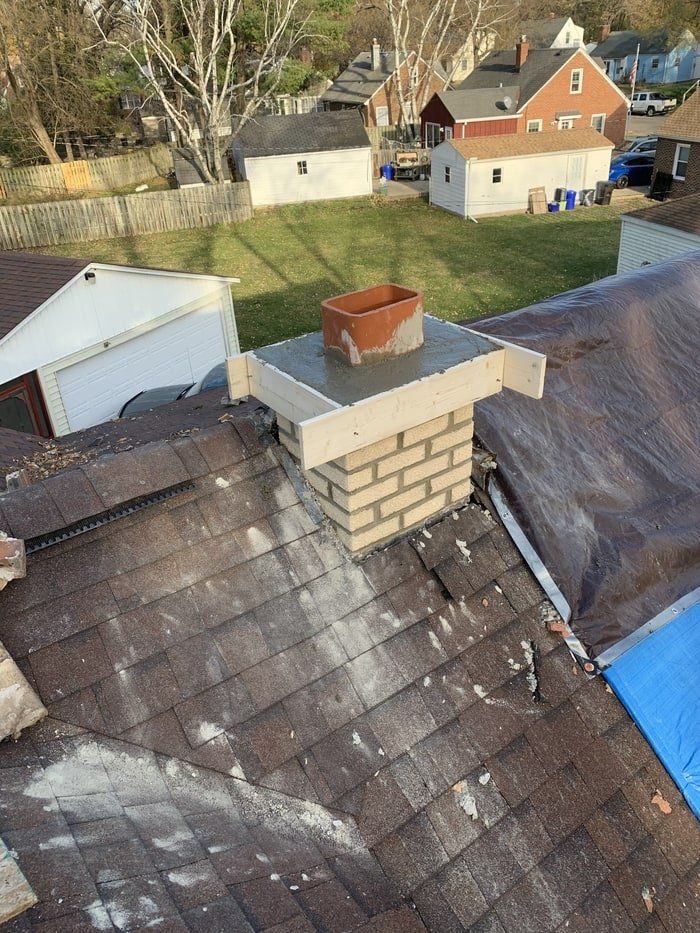Is it normal for rain to come down your chimney?
How do I know if my chimney is leaking?
Apart from hearing dripping sounds, you might get other signs to help you know that your chimney is possibly leaking. Here are some signs that could mean a leaking chimney besides dripping;
- If your fireplace has a stale smell or it is musty after a rainfall, snowfall like old campfires
- If you see water paths stains, moisture on the walls around the chimney or the ceiling,
- rusts on the metal damper and or a pool of water on your fireplace box
- Wallpapers are peeling off the walls around your fireplace
Why would it be leaking?
It is not normal for the rain to come down from your chimney and drip into your fireplace. Here are possible reasons for a leaking chimney;
No Chimney Cap
Rain may be coming down from your chimney due to lack of a chimney cap or the chimney cap has been damaged.
Typically, if there's no barrier to protect your chimney opening from precipitation like snow, rain, hail then it would easily get into your chimney and cause signs of a leak.
Weak Chimney Sealant
Also, if a chimney sealant, which serves as a connection between the chimney and the roof becomes weak, due to aging, or because of bad installation or damage, making it lose its seal, water may start dripping from your chimney.
Condensation
Your chimney may be leaking from the inside out, caused by condensation. Your chimney may not have the proper size for a liner which may soak up moisture from gas fumes and keep them wet all the time which can give symptoms of a leaking chimney.
Leaking Bricks
Bricks and mortars pass a lot of water and it could be the cause of a leak from the thawing of snow all through winter. If you are waterproofing your chimney make sure to use materials that would allow the water to be trapped inside the mortar and bricks which will get soggy and often allows water to seep into the house like silicone but instead use Chimney Saver from Saver Systems.
What should I do if its leaking?
A leaking chimney is not the end of the world and it could be fixed after identifying the source of the leak.
- Get a professional to install or repair your chimney cap or chimney cover, if the leak is from the chimney cover
- Use better materials for your chimney sealant
- If you notice that your chimney is leaking caused by the masonry, bricks and mortar leak, do a masonry absorption test to help you determine if you need to waterproof your chimney walls.
- The type of chimney design can cause damage to the mortar if it is the type that allows the chimney to feel a heavy rain impact. You can have a cricket installed to reduce the impact of the rain. Crickets are structured like roofs meant to divert water from the chimney.
- As a homeowner, you should maintain your chimney standard by doing an annual chimney check and cleaning, that way it could help you to discover a leak soon and quickly fix it and repair any damage.
Dangers of a leaky chimney
You must not ignore a leaking because it is not normal, because it will cause damages that may call for extensive repair, for example in the case of mold growth. If your chimney is leaking, it could lead to moisture damage which makes the chimney bricks clog the chimney after collapsing into it. From an open with no chimney cap, leaves could blow into your chimney and into your fireplace that could start a chimney fire. If debris blows into your chimney and starts a fire, the temperature becomes very hot, too hot for the masonry and the fuel lining, a fast-spreading house fire could start.
Animals like critters and other birds may build a nest inside the chimney and clog it too. A clogged chimney results in problems for an open airflow affecting your chimney system's heat and hot water, it could also cause a case of carbon monoxide poisoning which poses a great health risk to your household.
What does it cost to repair?
On average, to repair damage in their chimney, homeowners may have to spend from 85 dollars to 1,600 dollars. The type of damage, the extent of damage, the location, and the preferred option to repair the damage will affect the overall cost of repairing chimney leaks.
Would homeowners insurance the repair work?
Chimney leaks would generally cause damages that need repair, and these repairs are not free.
As a homeowner, you may want to know if your home insurance will cover the cost of repairing a damaged chimney. Your home insurance provider may or may not offer protection against the damages done by a chimney leak. Your insurance with some home insurance provider may not cover a chimney leak repair because it is not unexpected damage, neither is it sudden, a chimney leak must have continued over time before it can cause any real damage. It is therefore not seen as unforeseen according to the terms of insurance cover for a home.
In the case where your chimney started to leak suddenly, causing real damages to your home, this may be included under the cover of a basic policy. Insurers will pay for sudden damages related to a problem that is caused by a situation that is covered. You may not be able to get the full cost of the repair, so make sure you know the limiting factors to your claim. The amount you will be able to claim depends on your insurance provider and the type of policy you purchased. However, you need to keep in mind that the situations are not the same, while you may be covered for the repair of a leaking chimney in some situations, under other situations you may not be covered.



